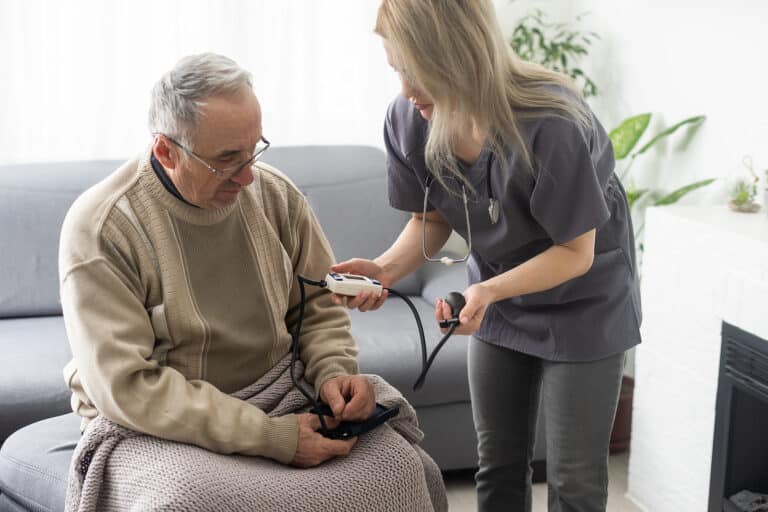Managing high blood pressure is crucial for maintaining overall health, especially for seniors. With the right lifestyle changes and support, you can help your loved ones achieve healthier blood pressure levels. In-home care providers can play an essential role in this process, offering guidance and assistance in implementing effective strategies.
In this blog, we’ll explore six actionable steps your loved one can take to lower high blood pressure, enhancing their well-being and quality of life.
What is High Blood Pressure?
High blood pressure occurs when the force of blood pushing against the walls of the arteries is consistently high. It can damage those arteries over time and lead to serious complications such as strokes and heart attacks. Because there are no outward symptoms of this occurring within the body, a visit to the doctor often includes a blood pressure check.
With a simple device, the physician can check your loved one’s blood pressure to see if it’s within the range of healthy levels or if it’s elevated. Two numbers are measured – the systolic number when the heart contracts and the diastolic number when the heart rests. Normal blood pressure will have a systolic number below 120 and a diastolic number less than 80. Anything above those numbers can mean elevated or high blood pressure.
How to Reduce High Blood Pressure with Lifestyle Changes
If your elderly loved one’s doctor has said his blood pressure is elevated or high, he will recommend a course of action to reduce those levels. Sometimes, that course of action may require medications, and it almost always asks for your loved one to make some lifestyle changes.
While taking medication may seem easier, lifestyle changes are a more holistic way to heal and promote overall better health with the help of in-home care providers. They will also complement any medication your loved one needs to take, making the medication more effective.
Six steps your loved one can implement right away with his in-home care team to lower his blood pressure:
Stop drinking alcohol.
Imbibing excessively in alcohol raises a person’s blood pressure. An occasional glass of wine or beer is still okay if it can be enjoyed in moderation. If not, it’s recommended to quit entirely.
Get moving.
Being active and especially enjoying at least 30 minutes of aerobic activity five times a week is a great way to reduce high blood pressure.
If your loved one needs a companion to exercise with or to take him to a safe location, an in-home care provider can be a great resource. The care provider can help with transportation to the senior center or gym and can even go on walks with him. Your loved one might be more inclined to keep exercising if he has a companion.
Increase potassium intake.
Potassium is great for high blood pressure. While supplements are one way to increase potassium, eating foods high in potassium is better. To increase potassium intake, add extra bananas, potatoes, and avocados to the diet.
Reduce salt intake.
High-sodium foods can increase blood pressure. Sodium can hide in many prepackaged foods, so help your loved one learn how to read labels so he avoids foods that are overloaded with sodium. His in-home care provider can help with shopping for replacement foods until he gets the knack for it.
Overall, enjoy a healthy diet.
While an occasional splurge on a milkshake or big juicy steak is fine, look for ways to make daily meals and snacks more heart-healthy by including fresh fruits and vegetables, whole grains, and low-fat dairy.
Maintain a healthy weight.
If your loved one is overweight, talk with his doctor about a healthy weight and ask for guidance on losing weight. Even a 10% loss of excessive weight can improve overall health tremendously.
If you or an aging loved one needs In-Home Care in Davis, CA, contact A Better Living Home Care today (916) 514-7006
- Helping Seniors Reduce Health Anxiety - April 18, 2025
- Why Should Seniors Consider Adding Soy to Their Diets? - April 7, 2025
- Four Ways to Celebrate Spring With Your Homebound Elderly Loved One - April 2, 2025


